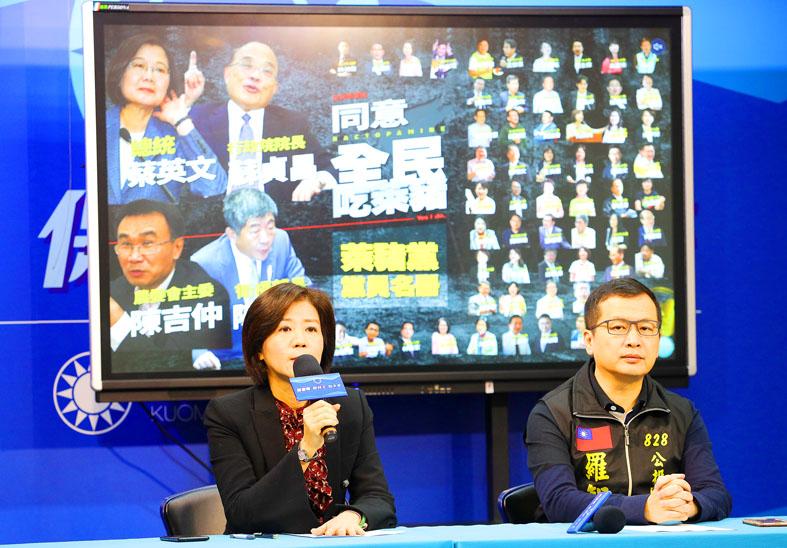The Chinese Nationalist Party (KMT) yesterday called on people to recall Democratic Progressive Party (DPP) lawmakers who pushed through executive directives to ease restrictions on US pork imports and to “thwart President Tsai Ing-wen’s (蔡英文) dictatorship through a referendum.”
Although ractopamine is banned for use in pigs in Taiwan because of concerns over its safety to animals and humans, Tsai on Aug. 28 announced that Taiwan would open up to imports of US beef from cattle 30 months or older and pork with acceptable levels of the leanness-enhancing drug.
The DPP, which holds 61 of the 113 seats in the Legislative Yuan, on Thursday pushed through the nine directives.

Photo: CNA
DPP lawmakers blocked opposition proposals to amend the Act Governing Food Safety and Sanitation (食品安全衛生管理法) and the School Health Act (學校衛生法) to ban ractopamine in food products, saying that the directives are sufficient to ensure food safety.
The policy, which is to go into effect on Friday next week, is widely viewed as an effort by the government to satisfy US prerequisites for negotiations on a bilateral trade deal.
Lawmakers from the KMT, the Taiwan People’s Party and the New Power Party objected to the policy, citing health concerns.
KMT Culture and Communications Committee director-general Alicia Wang (王育敏) told a news conference in Taipei yesterday that under the leadership of Tsai — the “ractopamine pork president” — almost all DPP lawmakers have turned a blind eye to public objections, even though they are elected representatives.
Wang cited a poll conducted by the KMT-affiliated National Policy Foundation last month that showed 70.6 percent of respondents opposed imports of pork products containing ractopamine residue.
DPP caucus whip Ker Chien-ming (柯建銘) threatened to discipline DPP legislators Lin Shu-fen (林淑芬), Liu Chien-kuo (劉建國) and Chiang Yung-chang (江永昌) because they refused to follow voting directions, Wang said.
Other DPP lawmakers made ridiculous arguments, including DPP Legislator Rosalia Wu (吳思瑤), who said that blocking US pork products might create trade barriers for Taiwan and benefit China, Wang said, asking what China has to do with the issue.
Tsai has become a dictator and even refuses to acknowledge her own inconsistency regarding importing products with ractopamine, KMT Culture and Communications Committee deputy chairwoman Lee Yong-ping (李永萍) said, urging people to put a check on the DPP administration’s arrogance.
KMT Institute of Revolutionary Practice director Lo Chih-chiang (羅智強) called on people to recall Wu and sign the KMT’s referendum petition to block pork products containing traces of the additive.
While restrictions on US pork products are to be lifted next week, the KMT’s referendum, if it is passed on Aug. 28, would force the government to stop such imports, Lo said.
The referendum, which was initiated by KMT caucus whip Lin Wei-chou (林為洲), asks people if they agree that the government should ban imports of all pork products containing leanness-enhancing substances, including ractopamine.
The Central Election Commission on Friday last week said that Lin’s referendum proposal met legal requirements and could start to gather signatures to meet the threshold of 290,000 needed in the second stage.
Additional reporting by CNA

The Ministry of Economic Affairs has fined Taobao NT$1.2 million (US$36,912) for advertisements that exceed its approved business scope, requiring the Chinese e-commerce platform to make corrections in the first half of this year or its license may be revoked. Lawmakers have called for stricter enforcement of Chinese e-commerce platforms and measures to prevent China from laundering its goods through Taiwan in response to US President Donald Trump’s heavy tariffs on China. The Legislative Yuan’s Finance Committee met today to discuss policies to prevent China from dumping goods in Taiwan, inviting government agencies to report. Democratic Progressive Party Legislator Kuo Kuo-wen (郭國文) said

The Ministry of Economic Affairs has fined Taobao NT$1.2 million (US$36,900) for advertisements that exceeded its approved business scope and ordered the Chinese e-commerce platform to make corrections in the first half of this year or its license would be revoked. Lawmakers have called for stricter supervision of Chinese e-commerce platforms and more stringent measures to prevent China from laundering its goods through Taiwan as US President Donald Trump’s administration cracks down on origin laundering. The legislature’s Finance Committee yesterday met to discuss policies to prevent China from dumping goods in Taiwan, inviting government agencies to report on the matter. Democratic Progressive Party

Taiwan and its Pacific ally Tuvalu on Tuesday signed two accords aimed at facilitating bilateral cooperation on labor affairs, according to Taiwan’s Ministry of Foreign Affairs (MOFA). The governments inked two agreements in Taipei, witnessed by Foreign Minister Lin Chia-lung (林佳龍) and visiting Deputy Tuvaluan Prime Minister Panapasi Nelesone, MOFA said in a news release. According to MOFA, the agreements will facilitate cooperation on labor issues and allow the two sides to mutually recognize seafarers’ certificates and related training. Taiwan would also continue to collaborate with Tuvalu across various fields to promote economic prosperity as well as the well-being of their

Sung Chien-liang (宋建樑), who led efforts to recall Democratic Progressive Party (DPP) Legislator Lee Kun-cheng (李坤城), was released on bail of NT$80,000 today amid outcry over his decision to wear a Nazi armband to questioning the night before. Sung arrived at the New Taipei District Prosecutors’ Office for questioning in a recall petition forgery case last night wearing a red armband bearing a swastika, carrying a copy of Adolf Hitler’s Mein Kampf and giving a Nazi salute. Sung left the building at 1:15am without the armband and covering the book with his coat. Lee said today that this is a serious